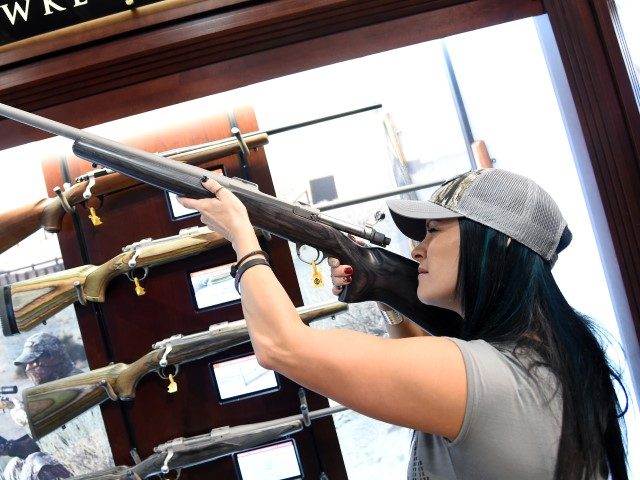WASHINGTON, DC – President Joe Biden called for American adults ages 18–20 to be barred from buying modern sporting rifles, but a federal appeals court has ruled that the Second Amendment fully applies at age 18, making it likely that such a restriction would be struck down as unconstitutional.
Biden specifically said he would raise the age on “assault weapons,” but there is no such thing as an “assault weapon.” Biden’s nominee for ATF director couldn’t even define the term when Sen. Tom Cotton challenged him to do so.
So assuming Biden meant assault rifles – more correctly called modern sporting rifles – the key to this constitutional question is found in 18 U.S.C. § 922(b)(1) and (c)(1). Those provisions of a federal law say that, although an 18-year-old can buy a long gun (rifle or shotgun) from anyone, an adult must be at least 21 to buy a handgun (pistol or revolver) from a FFL (a federal firearm license holder) – in other words, a gun store. A citizen can buy a handgun from another source starting at age 18, but an American must be 21 to buy a handgun from a federally regulated retail outlet.
That makes no sense to many people. At age 18 you can buy a handgun from a friend, a sister, or even that creepy neighbor down the street but not from a regulated, monitored, professional store that will first conduct a proper background check. But that is the law.
Biden seemed oblivious to all this when he said – falsely – in his divisive primetime speech that an 18-year-old cannot buy a handgun from any source in Texas. Not surprisingly, various lawsuits have been filed in recent years challenging that restriction.
In 2021, the U.S. Court of Appeals for the Fourth Circuit held that the restriction violates the Constitution’s Second Amendment right to keep and bear arms, setting the stage to strike it down in the states of Virginia, West Virginia, Maryland, North Carolina, and South Carolina as this case continues. After many pages of analysis, the court concluded:
A review of the Constitution’s text, structure, and history reveals that 18-year-olds are covered by the Second Amendment. Like most other constitutional rights, the Second Amendment has no explicit age limit, and the most analogous constitutional rights apply equally to everyone. And when a constitutional right applies differently to minors, the age cutoff has consistently been set at 18, not 21.
Founding-era history confirms that the public understood the Second Amendment to cover 18-year-olds. At the time of ratification, every state and the federal government required 18-year-old men to enroll in the militia. Those in the militia, as Heller reminds us, were a subset of the political community known as “the people” that enjoyed Second Amendment rights. While most of the militia laws the government identifies still allowed 18-year-olds to join the militia, those that required enlistees to be 21 are few in number and distant in time from ratification. So the historical basis for those 18 and older having Second Amendment rights rests on firm ground.
Nor is the Fourth Circuit alone. Seven judges in the Fifth Circuit took the same position, as written by one of the most respected federal appeals judges in the nation, Judge Edith Jones. In 2013, Jones explained to seven dissenting judges why the Second Amendment allows law-abiding adults ages 18–20 to buy handguns:
Congress has seriously interfered with this group’s constitutional rights because of a class-based determination that applies to, at best, a tiny percentage of the lawbreakers among the class. Of course, the lawbreakers obtain handguns, but the law-abiding young adults are prevented from doing so, which adds an unusual and perverse twist to the constitutional analysis. I stress again [the judges’ ruling on the other side, saying that younger adults as a group are] “irresponsible”; the Second Amendment protects “law-abiding responsible adults”; the Second Amendment permits “categorical regulation of gun possession by classes of persons” irrespective of their being within the core zone of rights-holders; and finally, “Congress could have sought to prohibit all persons under 21 from possessing handguns—or all guns, for that matter.”
If any of these phrases were used in connection with a First Amendment free speech claim, they would be odious. Free speech rights are not subject to tests of “responsible adults,” speakers are not age-restricted, and class-based abridgement of speech is unthinkable today. Even if it is granted that safety concerns exist along with the ownership of firearms, they exist also with regards to incendiary speech. Some reasonable regulations are surely permissible, but the panel’s approval of banning young adults from the commercial and federally regulated market for the quintessential self-defense weapon is class-based invidious discrimination against a group of largely law-abiding citizens.
It would be interesting to see if the Biden administration attempts to argue that modern sporting rifles should be treated differently than handguns, given that Biden himself suggested in the past few days that he could ban 9mm handguns – which is a common barrel size for a standard handgun and smaller than many other common sizes like .40-caliber – and that modern sporting rifles have a similar profile in the marketplace. It would seem that age-based restrictions on one would stand or fall with the other in a constitutional challenge.
This does not mean that Biden cannot seek to make the purchase age 21. All it means is that because the Constitution guarantees the right to bear arms at age 18, any change Biden and his Democrat Party would like to enact regarding the purchase age would likely need to be done through a constitutional amendment. The White House has said nothing to suggest Biden is willing to take on that challenge.
Ken Klukowski is an attorney who served in the White House and Justice Department, and works on Second Amendment issues.

COMMENTS
Please let us know if you're having issues with commenting.